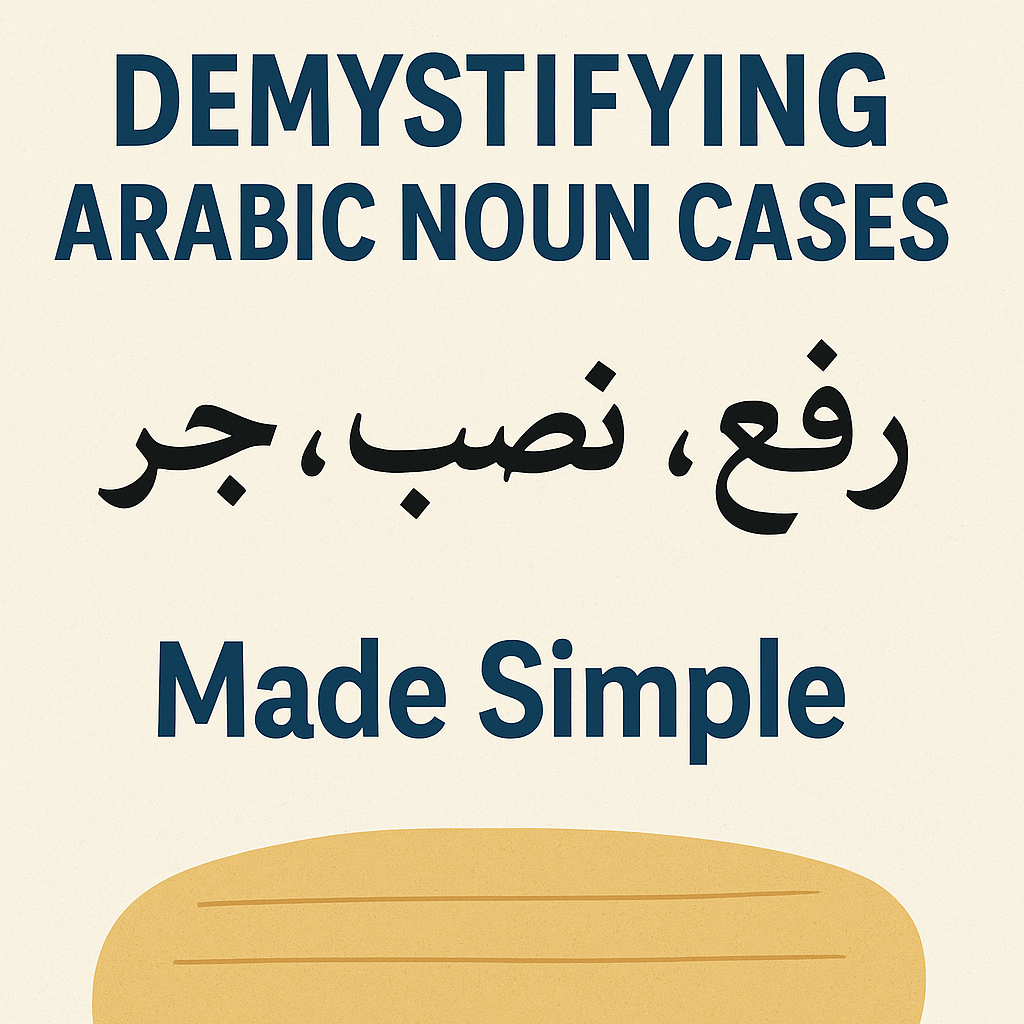Demystifying Arabic Noun Cases رفع، نصب، جر: Made Simple

When you begin learning Arabic, one of the concepts that can seem intimidating is Arabic noun cases رفع، نصب، جر. They sound technical and look complex, especially when you first encounter the many endings that change based on grammar. But here’s the good news: once you understand the core idea behind them, these noun cases become a powerful tool in mastering Arabic fluency and understanding Arabic texts.
In this blog post, we’ll break down Arabic noun cases (رفع، نصب، جر) in a simple, friendly way, so you can start using them with confidence. Whether you’re a beginner or brushing up your skills, this guide will help you demystify Arabic noun cases and use them like a pro.
Let’s dive in!
What Are Arabic Noun Cases?
In Arabic, nouns and adjectives change their endings depending on their role in a sentence. This system is called الإعراب (al-i‘rāb), and the three main noun cases are:
-
الرفع (Raf‘) – Nominative case
-
النصب (Naṣb) – Accusative case
-
الجر (Jarr) – Genitive case
These cases help you understand what the noun is doing in a sentence – is it the subject? The object? Is it coming after a preposition? Arabic uses vowel endings to mark this, and that’s what we’ll be focusing on.
Let’s simplify this with examples and rules.
1. Case of رفع (Raf‘) – The Nominative Case
When is it used?
-
When the noun is the subject of a sentence.
-
When the noun is the doer of the verb.
-
When used in nominal sentences (جملة اسمية) without a verb.
Common Ending:
-
For indefinite singular nouns: ـٌ (Dammah tanween)
-
For definite singular nouns: ـُ (Dammah)
Examples:
-
الولدُ يقرأُ الكتابَ.
Al-waladu yaqra’u al-kitāba.
The boy is reading the book.
→ “الولدُ” (the boy) is the subject, so it takes Raf‘. -
الكتابُ مفيدٌ.
Al-kitābu mufīdun.
The book is useful.
→ Both “الكتابُ” and “مفيدٌ” are in Raf‘ because they are part of a nominal sentence.
Understanding the Raf‘ case is the first step in mastering Arabic noun cases رفع، نصب، جر.
2. Case of نصب (Naṣb) – The Accusative Case
When is it used?
-
For the direct object of a verb.
-
After certain particles (like أن or لن).
-
For describing time, place, or manner.
-
As part of the predicate in كان وأخواتها (Kaana and its sisters).
Common Ending:
-
For indefinite singular nouns: ـً (Fatḥah tanween)
-
For definite singular nouns: ـَ (Fatḥah)
Examples:
-
قرأتُ الكتابَ.
Qara’tu al-kitāba.
I read the book.
→ “الكتابَ” is the object, so it’s in Naṣb. -
لن أذهبَ اليومَ.
Lan adhhaba al-yawma.
I will not go today.
→ “أذهبَ” is in نصب because of لن, and اليومَ is in نصب as a time adverb.
Once you recognize these patterns, you’ll find that Arabic noun cases رفع، نصب، جر are not mysterious—they follow clear logic.
3. Case of جر (Jarr) – The Genitive Case
When is it used?
-
After prepositions (حروف الجر)
-
In إضافة (idāfah) constructions – the second noun in the possessive phrase.
Common Ending:
-
For indefinite singular nouns: ـٍ (Kasrah tanween)
-
For definite singular nouns: ـِ (Kasrah)
Examples:
-
ذهبتُ إلى المدرسةِ.
Dhahabtu ilā al-madrasati.
I went to the school.
→ “المدرسةِ” is after a preposition, so it’s in Jarr. -
كتابُ الطالبِ.
Kitābu al-ṭālibi.
The student’s book.
→ “الطالبِ” is in Jarr because it’s the second part of an idāfa.
The Jarr case is one of the easiest to identify, especially when you look for prepositions like من، إلى، على، في، بـ، لـ، عن.
Why Do Arabic Noun Cases Matter?
Here’s why you should care about Arabic noun cases رفع، نصب، جر:
-
They clarify sentence roles – Subject, object, and more.
-
They reduce confusion – Word order in Arabic is flexible, and cases help preserve meaning.
-
They make your Arabic sound natural – You’ll sound more fluent and educated.
-
They are essential for reading the Qur’an, media, and literature – Especially in Modern Standard Arabic and Classical Arabic.
At Al Arabiya Institute, our online Arabic courses focus on making grammar concepts like noun cases interactive, practical, and easy to master, whether you’re learning Arabic for communication, religion, or professional use.
The Impact of Harakaat on Noun Cases
The small vowel marks you see above or below Arabic letters—dammah (ـُ), fatḥah (ـَ), kasrah (ـِ)—are called harakaat. These are what mark the noun case on the final letter.
For example:
-
مسجدٌ (masjidun) – Raf‘
-
مسجدًا (masjidan) – Naṣb
-
مسجدٍ (masjidin) – Jarr
This is what we call i‘rāb endings, and it’s essential for both speaking and reading Arabic correctly.
Even though in casual speech these endings are not always pronounced, they’re important in writing and formal Arabic. At Al Arabiya Institute, we teach you how to read with confidence, even if you start from zero.
How to Master Arabic Noun Cases رفع، نصب، جر
Here are some practical tips:
1. Learn Through Context
Don’t just memorize tables—see nouns in action in real sentences. Use stories, dialogues, and Quranic verses to see how noun cases are applied.
2. Practice With Reading and Listening
Focus on reading short texts with harakaat and listen to formal Arabic (like news or Qur’an) to get used to the correct pronunciation of noun cases.
3. Get Feedback
Join online Arabic classes where your teacher can correct your use of noun cases. This is where the interactive courses at Al Arabiya Institute make a huge difference.
4. Use Charts and Color Coding
Visual learners benefit from highlighting رفع، نصب، جر endings in different colors. It makes the patterns easier to memorize.
Common Pitfalls with Arabic Noun Cases رفع، نصب، جر
-
Ignoring the role of the word in the sentence (is it subject or object?).
-
Mixing up Harakaat – confusing fatḥah with kasrah.
-
Not recognizing idāfa or prepositions, which affect case endings.
-
Skipping case endings when speaking, leading to fossilized errors.
But don’t worry—these mistakes are part of the learning process. With proper guidance, you’ll master these cases quickly.
Learn Arabic Noun Cases رفع، نصب، جر With Confidence
At Al Arabiya Institute, we specialize in helping non-native speakers understand Arabic grammar without overwhelming them. Our experienced teachers explain complex topics like Arabic noun cases رفع، نصب، جر in ways that are engaging, practical, and tailored to your goals.
We offer:
-
Live online courses
-
One-on-one and group sessions
-
Affordable prices
-
Free trial lessons so you can test our quality before committing
Visit our website learning-arabic.com to get started today.
Final Thoughts
Arabic noun cases رفع، نصب، جر are not as scary as they seem. Think of them as signposts that help you understand who is doing what in a sentence. With consistent practice, exposure to examples, and guidance from experienced teachers, you’ll find that these grammar rules become second nature.
Let go of the fear and embrace the structure—Arabic becomes easier when you understand how sentences are built.
At Al Arabiya Institute, we’re here to walk this journey with you—step by step, with care, clarity, and community.
Ready to master Arabic noun cases and beyond?
👉 Sign up for your free trial lesson today at learning-arabic.com – where Arabic learning is accessible, enjoyable, and affordable for everyone.








